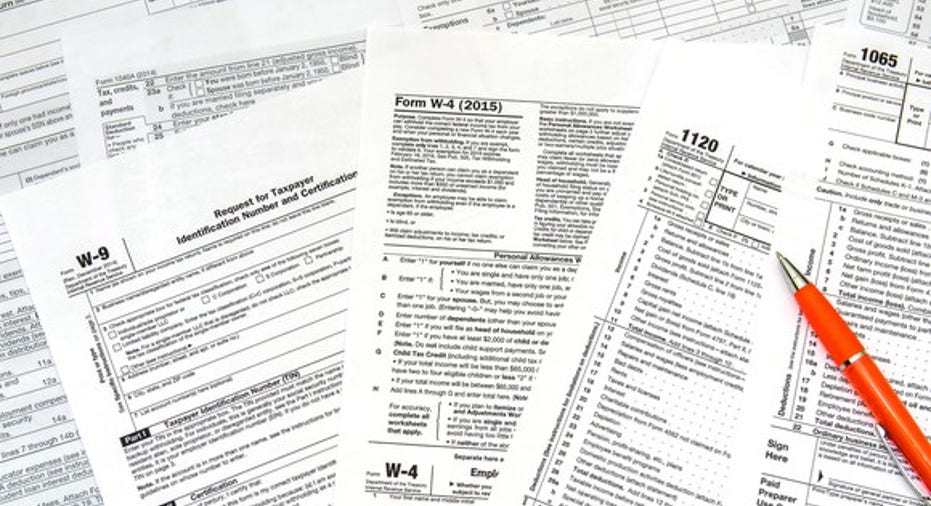How Would Hillary Clinton Change Your Taxes?

Hillary Clinton is clearly on a roll. First, she secured enough delegates to become the Democratic Party's presumptive presidential nominee. Then she got a glowing endorsement from President Obama.
Now, as she looks toward what could be a fierce battle with Republican candidate Donald Trump, she'd better get ready to defend her stance on a perennial hot-button issue: taxes. Clinton has a detailed tax-reform plan in the works, but investors and wealthy Americans may not like it.
IMAGE SOURCE: GETTY IMAGES.
Higher income-tax rates for the country's richest
Clinton has said on more than one occasion that, if elected, she'd make sure the wealthy wind up paying their fair share. And her tax proposal no doubt reflects this thinking. For starters, she's suggesting a 4% surcharge on adjusted gross income (AGI) exceeding $5 million, and that surcharge would treat all income equally. In other words, it would not discriminate between payroll earnings and capital gains.
According to Clinton, this surcharge would generate $150 billion in tax revenue over the course of a decade, and it would likely impact just two out of every 10,000 taxpayers.
The following table illustrates Clinton's proposed changes:
|
Current Income Bracket |
Current Tax Rate |
Income Bracket Under Clinton |
Clinton's Proposed Tax Rate |
|---|---|---|---|
|
$0 - $18,450 |
10% |
$0 - $18,550 |
10% |
|
$18,451 - $74,900 |
15% |
$18,550 - $75,300 |
15% |
|
$74,901 - $151,200 |
25% |
$75,300 - $151,900 |
25% |
|
$151,201 - $230,450 |
28% |
$151,900 - $231,450 |
28% |
|
$230,451 - $411,500 |
33% |
$231,450 - $413,350 |
33% |
|
$411,501 - $464,850 |
35% |
$413,350 - $466,950 |
35% |
|
$464,851 and up |
39.6% |
$466,950 - $5,000,000 |
39.6% |
|
$5,000,000 and up |
43.6% |
TABLE BY AUTHOR. DATA SOURCE: TAXFOUNDATION.ORG.
Clinton is also seeking to enact the Buffett Rule, which requires anyone with an AGI over $1 million to pay a minimum of 30% in income taxes. This tax would be phased in between $1 million and $2 million in AGI.
The idea behind the Buffett Rule is that no household earning more than $1 million should pay a smaller share of its income in taxes than middle-class households pay. The name comes from investing giant Warren Buffett's claim that, as a billionaire, he manages to pay a lower tax rate than his secretary.
Furthermore, Clinton's tax plan caps all itemized deductions to a tax value of 28% percent. Wealthy individuals are often able to lower their taxes via strategic deductions, but under Clinton's proposal, their savings would be limited to $0.28 per dollar in tax deductions.
Higher taxes on capital gains
Clinton is also looking to change the way capital gains are taxed. Right now, long-term capital gains are taxed at a lower rate than ordinary income. Long-term capital gains are defined as investments that are held for over a year before they're sold at a profit. According to the current tax code, the country's highest earners -- those making over $400,000 -- pay a 20% tax on long-term capital gains.
Clinton plans to preserve that rate for high earners, albeit with a new definition of "long-term." Under Clinton, that 20% rate would only apply to investments held for at least six years, while investments held for less than two years would be subject to the same tax rate as ordinary income. In addition to higher capital gains tax rates, Clinton plans to preserve the current 3.8% net investment income tax that's imposed on households with AGIs over $250,000 whose gains exceed a certain threshold.
The following table illustrates how Clinton wants to treat capital gains for the country's top earners:
|
Years Held |
Marginal Tax Rate |
Net Investment Income Tax |
Surtax on Incomes Over $5 million |
Combined Tax Rate on Capital Gains |
|---|---|---|---|---|
|
Less than 1 |
39.6% |
3.8% |
4% |
47.4% |
|
1-2 years |
39.6% |
3.8% |
4% |
47.4% |
|
2-3 years |
36% |
3.8% |
4% |
43.8% |
|
3-4 years |
32% |
3.8% |
4% |
39.8% |
|
4-5 years |
28% |
3.8% |
4% |
35.8% |
|
5-6 years |
24% |
3.8% |
4% |
31.8% |
|
More than 6 |
20% |
3.8% |
4% |
27.8% |
TABLE BY AUTHOR. DATA SOURCE: TAXFOUNDATION.ORG.
Higher estate taxes
Under Clinton's proposal, those who inherit large sums of money will be taxed more heavily, as well. Clinton plans to tax estates worth more than $3.5 million, or $7 million for married couples. That threshold is below today's estate-tax exemption level of $5.45 million per individual, or $10.9 million for couples. She also plans to raise the top estate-tax rate to 45%, up from 40% as it currently stands.
Hitting the rich where it hurts
Under Clinton's proposal, the top 1% of households -- those earning more than $730,000 -- would likely see their tax burden increase by more than $78,000 on average. The overwhelming majority of American taxpayers, however, would probably see little change in their taxes.
Of course, it's too soon to know whether Clinton will not only get elected, but ultimately get her way when it comes to tax reform. However, one thing's for sure: She's giving voters, especially wealthy ones, plenty to think about.
The article How Would Hillary Clinton Change Your Taxes? originally appeared on Fool.com.
Try any of our Foolish newsletter services free for 30 days. We Fools may not all hold the same opinions, but we all believe that considering a diverse range of insights makes us better investors. The Motley Fool has a disclosure policy.
Copyright 1995 - 2016 The Motley Fool, LLC. All rights reserved. The Motley Fool has a disclosure policy.



















